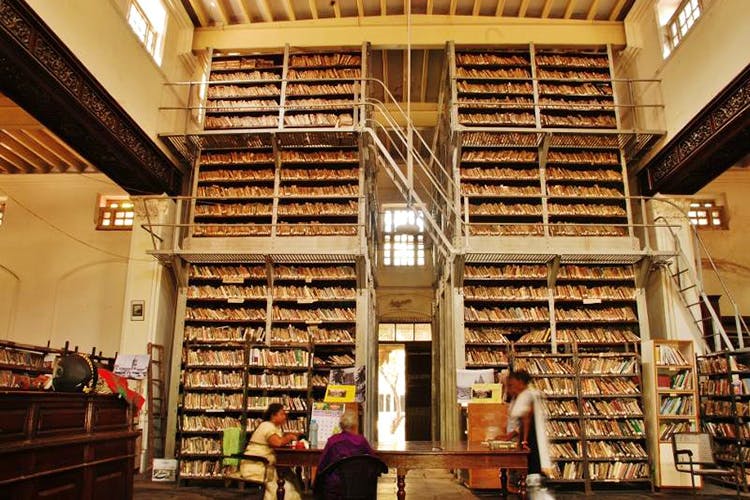Possibly one of India’s oldest surviving lending libraries, the Madras Literary Society functioned as part of the College of Fort St George from 1817 and was a repository of all discoveries and experiences — whether scientific, literary or otherwise — that were made in the Madras Presidency. The society aimed to conduct and promote research and did this by making its collections available to scholars, universities, government bodies, and the general public. Loyal and frequent members included Subhas Chandra Bose, Annie Besant, and T T Krishnamachari.
Since 1906, the library has stood in the tranquil, green premises that house the Directorate of Public Instruction in Nungambakkam. The red-brick building is particularly interesting to any architecture buff with its obvious Indo-Saracenic features so typical of most of old Madras buildings, and its other enchanting little additions like its sandstone trimmings, a Madras Terrace roof, walls of brick with lime mortar and several Rajasthani-style elements. Inside the building are books stacked from floor to ceiling on 60-foot-high shelves, with metallic staircases used to access the books and, in a charming, old-world addition, a pulley mechanism to transport the books from one floor to another.
As for the collection itself, the Madras Literary Society is a treasure trove of geographical and historical manuscripts, literary masterpieces, tomes on religion, art and philosophy, and volumes of fiction, reflecting the diverse reading tastes of members over a century. It is home to bibliophilic riches like Aristotle’s Opera Omnia, Newton’s Principia Mathematica, as well as rare, dog-eared books on Tamil grammar, and yellowing documents like surveys of the Buckingham Canal Project or maps of the Ganga. The collection is over 50,000 books rich and serves the lay reader just as well as an expert or researcher.
However, despite its status as a tangible and significant colonial heritage and its awe-inspiring collections, the Madras Literary Society sees few visitors. Efforts to draw greater numbers include affordable members’ subscriptions, and a unique tradition of home delivering books to members for a small additional amount. In an attempt to conserve and restore brittle, slowly crumbling books of value, individuals may ‘adopt a book’ by a new scheme, fund its restoration, and see their name on its pages!
To cater to Chennai’s younger readers, the Madras Literary Society also constantly adds to its collection. Monthly talks and events are also organised to draw more book lovers and heritage enthusiasts to the premises, expand membership, and work towards walking the tightrope of preserving its legacy and adapting to contemporary preferences.


